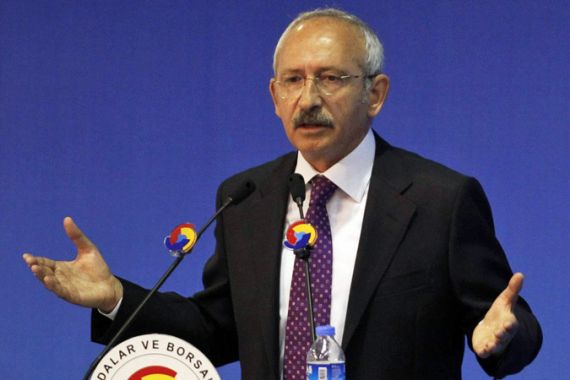Profile: Kemal Kilicdaroglu
Turkey’s main opposition party elected Kilicdaroglu in 2010, after the former chairman resigned over a sex scandal.

 |
| Kilicdaroglu has pledged to take the CHP into power and to fight poverty, unemployment and corruption [Reuters] |
Kemal Kilicdaroglu, 63, a social democrat, is the leader of the Republican People’s Party (CHP), Turkey’s main opposition group.
He stood unopposed for the leadership of the pro-secular party in May 2010, and is set to challenge Recep Tayyip Erdogan, the Turkish prime minister, in elections due next month.
| Turkish Elections: Party list |
|
Fifteen parties will field candidates in Sunday’s elections, according to Turkish electoral authorities. Independent candidates, notably those representing the pro-Kurdish Peace and Development Party (BDP) will also stand in many areas. |
“We will rebuild Turkey; we will improve democracy with rule of law,” Kilicdaroglu, told delegates at the CHP’s meeting in Ankara, the Turkish capital, last month.
As head of the opposition, he has pledged to take the CHP into power and to fight poverty, unemployment and corruption.
After being formally elected party leader, Kilicdaroglu said: “We will introduce a political ethics law. Racketeers, pillagers and swindlers have no place in parliament.”
The CHP has struggled in offering itself as an alternative to the Islamic-oriented ruling Justice and Development Party (AKP), often appearing to be authoritarian and out of step with its social-democratic grassroots.
Political scandal
The CHP suffered a blow in 2010 when a secretly taped video apppeared on the internet purportedly showing Deniz Baykal, its chairman, in an intimate encounter with a female legislator, who used to be his aide.
Baykal resigned on May 10, 2010, soon after the sex scandal erupted, prompting Kilicdaroglu to announce his candidacy for the leadership, five days before a party convention.
According to reports, the party was divided over the leadership issue, with its central executive board insisting that Baykal retake the position.
But Baykal decided not to run for re-election after Kilicdaroglu received the support of 77 of his party’s 81 provincial chairpersons.
 |
For a candidacy to become official, CHP by-law required the support of 20 per cent of convention delegates.
At the party convention, on May 22, 2010, Kilicdaroglu’s candidacy received the signatures of 1,246 out of the 1,250 delegates, setting a new record for the CHP.
The party’s executive committee then unanimously elected Kilicdaroglu as party chairman.
Kilicdaroglu, a former head of Turkey’s social security agency, led an association dedicated to fighting state corruption before winning a parliament seat in 2002.
He has since exposed documents alleging corruption that forced the resignation of two senior figures from the AKP.
The CHP is Turkey’s oldest political party, having been created by Mustafa Kemal Ataturk, the founder of modern Turkey, in 1923.
It lost the 2007 general elections to the AKP, which the CHP accuses of trying to undo the country’s secular system by mixing Islam with politics.
